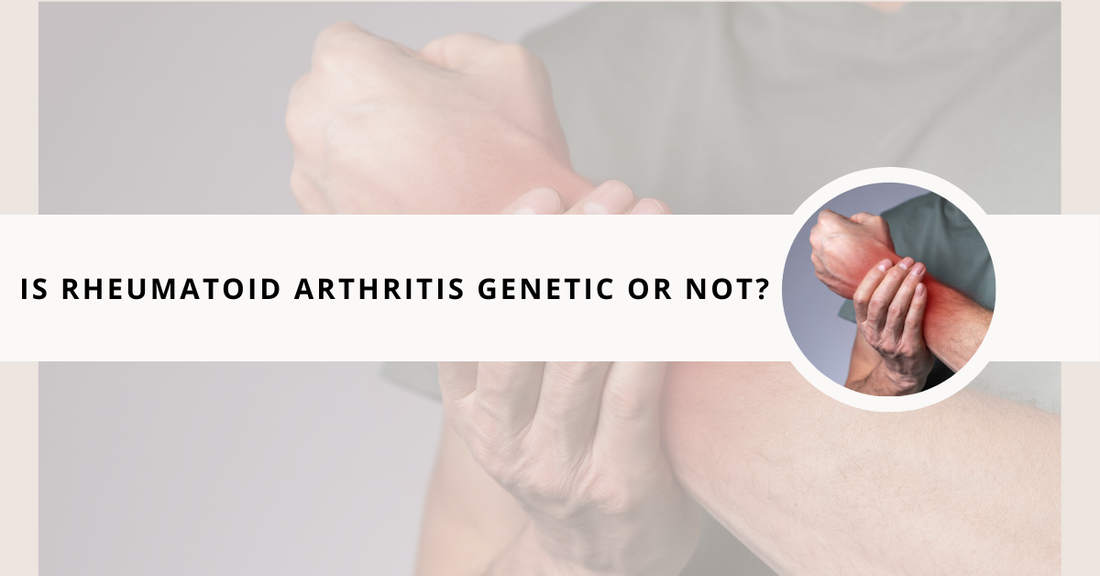
Is Rheumatoid Arthritis Genetic Or Not?
Share
Rheumatoid arthritis (RA) is a chronic autoimmune disease primarily affecting the joints, where the immune system mistakenly attacks the body’s own healthy tissues. It can lead to pain, swelling, stiffness and loss of joint function. RA typically affects the lining of joints and often presents symmetrically, impacting both sides of the body. Commonly affected areas include the wrists, hands, elbows, shoulders, feet, spine, knees, and jaw. Additional symptoms may include fatigue, fevers, and loss of appetite, and it can also cause complications in other organs like the heart and lungs. Fortunately, effective treatments are available to help individuals manage the disease and maintain a productive life.
Table of Contents
Symptoms of Rheumatoid Arthritis
Rheumatoid arthritis (RA) has various symptoms, ranging from mild inflammation to severe damage. Over time, the severity and frequency of flare-ups and remissions in the symptoms may change, sometimes resulting in joint abnormalities. RA is characterised by a number of symptoms, including
- Swelling, heated, and sensitive joints
- Stiffness in the morning
- Weary
- High temperature
- Appetite decline.
- Feel worn out and exhausted
- Complete lack of hunger (poor appetite)
- Losing weight
- Having a temperature increase or fever
- Excessive sweating
- Inflamed, dry eyes
- Chest pain due to inflammation.
It can worsen in flares due to triggers like stress, environmental factors, excessive activity, or medication discontinuation. Treatment aims to control the disease, ensuring it is in remission or near remission.
Causes of Rheumatoid Arthritis

The immune system's response to the body's joints and tissues is unknown. However, studies suggest that a combination of genetic, environmental, and sex hormone factors may contribute to the development of rheumatoid arthritis.
- Genetic factors such as cigarette smoke, inhalants, bacteria, viruses, gum disease, and lung disease may trigger the disease in individuals with specific genes that increase their risk.
- Environmental factors such as cigarette smoke, inhalants, bacteria, viruses, gum disease, and lung disease may also play a role.
- Sex hormones may also play a role in the development of rheumatoid arthritis when genetic and environmental factors are involved. Women are more likely to develop the disease than men, and the disease may improve during pregnancy and flare after.
Is Rheumatoid Arthritis Genetic or Hereditary?
Rheumatoid arthritis (RA) is a complex autoimmune disease characterised by inflammation of the joints. While its exact cause is not fully understood, both genetic and environmental factors play significant roles in its development.
RA has a hereditary component, meaning that it can run in families. Individuals with a family history of the disease are at a higher risk of developing RA compared to those without such a history.
- HLA-DRB1 Gene: One of the most significant genetic factors associated with RA is the presence of certain alleles in the HLA-DRB1 gene, which is part of the major histocompatibility complex (MHC). These alleles are believed to influence how the immune system recognises and responds to antigens.
- Other Genetic Variants: In addition to HLA-DRB1, several other genetic variants have been identified that may contribute to the risk of RA. These include genes involved in immune regulation and inflammation, such as PTPN22 and STAT4.
- Polygenic Nature: RA is considered a polygenic disease, meaning that multiple genes contribute to its risk. While certain genes increase susceptibility, they do not determine the disease's onset or severity on their own.
The interplay between genetic predisposition and environmental triggers is crucial in the development of RA. For example, an individual with a genetic predisposition may remain healthy if not exposed to certain environmental triggers. Conversely, a person without a family history of RA may develop the condition if exposed to significant risk factors.
Research suggests that infections, smoking, hormonal factors, and obesity can all contribute to the development of RA.
- Infections, particularly viral or bacterial, may trigger RA in genetically predisposed individuals, but the exact pathogens and roles are still under investigation.
- Smoking, especially in individuals with the HLA-DRB1 gene, may induce immune system changes and contribute to the disease's development.
- Hormonal differences, such as those during pregnancy or menopause, may also influence the disease's activity.
- Obesity and certain dietary factors may also have protective effects.
While rheumatoid arthritis has a genetic component and can run in families, it is not purely hereditary. It arises from a complex interplay of genetic susceptibility and environmental factors. Understanding these relationships can help in identifying at-risk individuals and developing targeted prevention.
Is There A Genetic Test For Rheumatoid Arthritis?

Rheumatoid arthritis is a challenging condition due to its association with joint stiffness and inflammation. Early treatment of RA is highly variable, and some patients may go into remission without treatment. A diagnosis to accurately categorise a patient's future course could help identify those with good outcomes who can be treated symptomatically or those with poor prognosis.
- It requires a physical examination by a GP, which may include a physical examination of joints, a detailed description of symptoms, and referral to a specialist.
- A blood test measures levels of rheumatoid factors in the blood, which are proteins produced by the immune system when it attacks healthy tissue.
- Blood tests, such as ESR, CRP, and full blood count, can help confirm the diagnosis. While no test can definitively prove or rule out rheumatoid arthritis, they can provide indications of the condition and help rule out other possible causes.
- The immune system also produces an associated blood test known as the anti-cyclic citrullinated peptide (anti-CCP) test. People who test positive for anti-CCP are very likely to develop rheumatoid arthritis, but not everybody with rheumatoid arthritis has this antibody. Those who test positive for both rheumatoid factor and anti-CCP may be more likely to have severe rheumatoid arthritis, requiring higher levels of treatment.
- Joint scans can be used to check for joint inflammation and damage, helping to distinguish between types of arthritis and monitor the condition's progression over time. These scans include X-rays and MRI scans.
If diagnosed with rheumatoid arthritis, a specialist will assess your physical ability, including how well you can do everyday tasks and your grip strength. This assessment may be repeated after treatment to see if any improvements have been made.
Is Juvenile Rheumatoid Athritis Genetic?
Juvenile Rheumatoid Arthritis (JRA), also known as Juvenile Idiopathic Arthritis (JIA), has a complex aetiology that involves both genetic and environmental factors. While the exact cause is not fully understood, research suggests that genetics play a significant role in the susceptibility to JRA. Juvenile Rheumatoid Arthritis (JRA) causes
Genetic Factors:
- Family History: Children with a history of autoimmune diseases are at a higher risk.
- HLA Genes: Specific HLA genes, particularly HLA-DR4, are associated with an increased risk of JRA.
- Other Genetic Markers: Polymorphisms in genes related to immune regulation and inflammatory responses may be associated with JRA.
- Twin Studies: If one twin has JRA, the other is at a higher risk.
Environmental Factors:
- Infections: Certain viral or bacterial infections may trigger autoimmune responses in genetically predisposed individuals.
- Environmental Exposures: Exposure to toxins or climate changes may also play a role.
In conclusion, genetics plays a major role in the likelihood of developing juvenile rheumatoid arthritis; however, the interaction of genetic predispositions with environmental triggers is what ultimately determines when the disease manifests itself.
Frequently Asked Questions
Does rheumatoid arthritis run in families?
One’s risk of developing rheumatoid arthritis is influenced by genetics and family history. If you have family members with RA, you are more likely to develop the disease. There are several genetic factors that slightly increase the risk of getting RA.
Can you prevent rheumatoid arthritis?
Although there is no surefire method to avoid RA, some rheumatologists think that everyone can avoid RA regardless of genetic susceptibility by leading a healthy lifestyle. Common lifestyle risk factors such as obesity, smoking, gum disease, microbiomes, and food triggers like dairy products can all be monitored.
Can rheumatoid arthritis go away?
Rheumatoid arthritis (RA) is a chronic condition with no cure. Early diagnosis and treatment can help manage symptoms and achieve periods of remission. Treatment options include medication, supportive treatments like physical therapy and occupational therapy, and surgery to correct joint problems. Self-care can also contribute to a longer life, improved quality of life, and increased independence.
Does rheumatoid arthritis get worse with age?
Rheumatoid arthritis can strike at any age, but as people age, their chance of getting the condition rises. Juvenile idiopathic arthritis, akin to rheumatoid arthritis, can be diagnosed in children and younger teens.
